For lonely men in Spanish towns, the ‘caravan of women’ brings hope of love
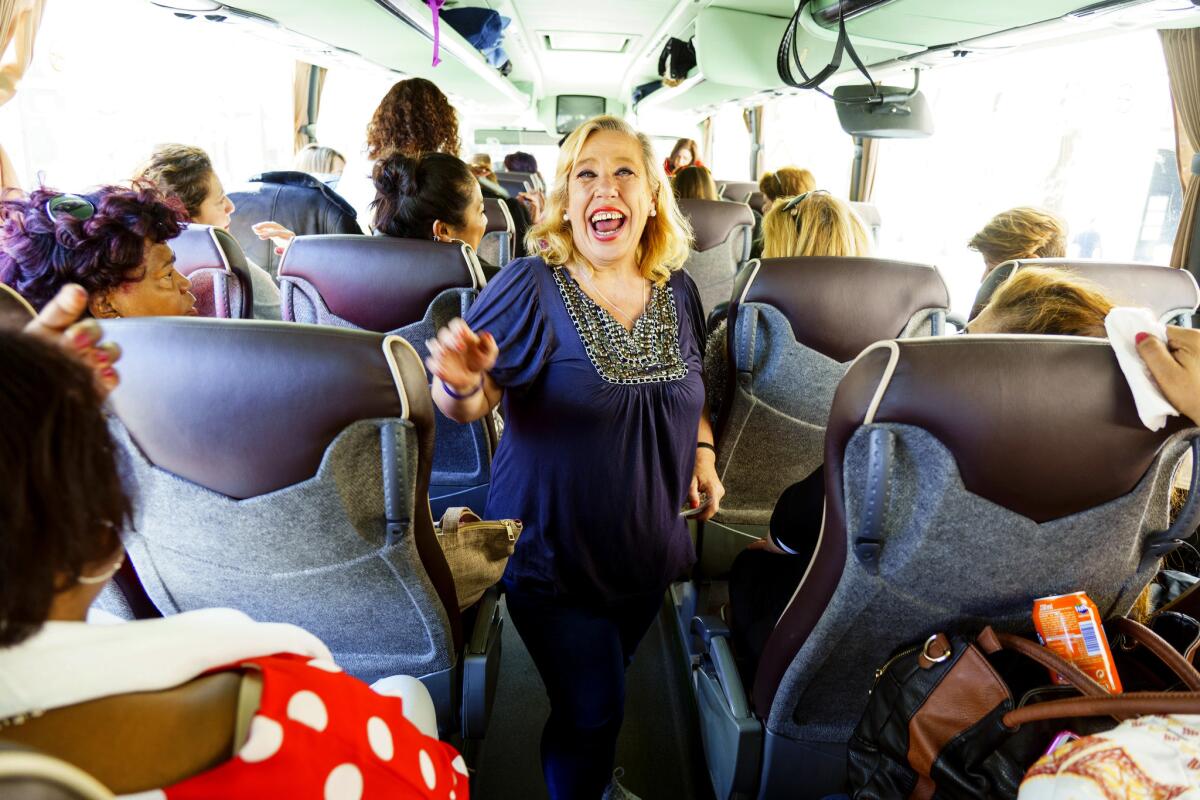
- Share via
The charter bus turns off the lonely highway onto a narrow street surrounded by fields of cereal grass, and the air begins to smell of perfume.
Fifty women shuffle in their seats, digging into their handbags for mascara and lip gloss and combs. They raise their hands to their heads and smooth down flyaway hairs. One woman unrolls the curler she’s kept in her bangs for hours, and her blond-streaked hair bounces. Another checks her sparkling turquoise eyeliner in a compact mirror.
Some sing under their breath to the staticky Latin music that floats through the bus and glance anxiously out the window, at the cluster of houses rising out of this empty stretch of middle Spain.
The bus stops by a wide storage shed, the kind that holds a well-worn tractor. The women cheer. After a six-hour journey from Madrid — four on the bus, two for a lunch of sandwiches and sangria in a bar along the way — they’ve reached the town of Calzadilla de la Cueza, where they hope to find someone to love.
They have paid 23 dollars to ride on la caravana de mujeres, a private bus that takes single women from Madrid to small, rural towns for an evening of food, drink and dance with local farmers.
The women represent a cross section of Spain’s turn-of-the-21st-century immigration boom. They are colombianas and dominicanas, cubanas and peruanas. They are acupuncturists and writers and caregivers and chefs. They are domestic violence survivors, single mothers, proud grandmothers. Some are divorced. Few are Spanish.
Three men lean against dusty trucks near the red-brick hotel where, a few hours later, there will be dining and dancing. Their sun-wrinkled faces are impassive as they stare at the women spilling into a tiny plaza, where they straighten their skirts, light cigarettes and take selfies in the fading daylight. The bus arrived about 7:30 p.m., earlier than expected, and most of the men are still at work in the surrounding farmland. They’ll come soon, the hotel owner assures the women. Everyone just has to wait.
Guadalupe de la Quintana Soles, 60, adjusts her gold jacket and scans the razor-flat plain beyond the plaza. She smiles, but she is anxious, wondering if today might be the day she finally meets a man. She first rode one of these buses two decades ago, when she was 39 and everything was new: the country, the city, her relationship status. Recently divorced, Quintana rode a handful of caravans with three girlfriends, all Peruvian like her.
It was a refreshing getaway from sprawling, polluted Madrid, and the locals were nice enough — taciturn, but gentler than the high-strung city men. Then, one by one, her friends fell in love and married. They stopped going. This time, Quintana’s 28-year-old niece is her wingwoman. “Ojala,” the niece says. God willing. “I hope she meets someone.”
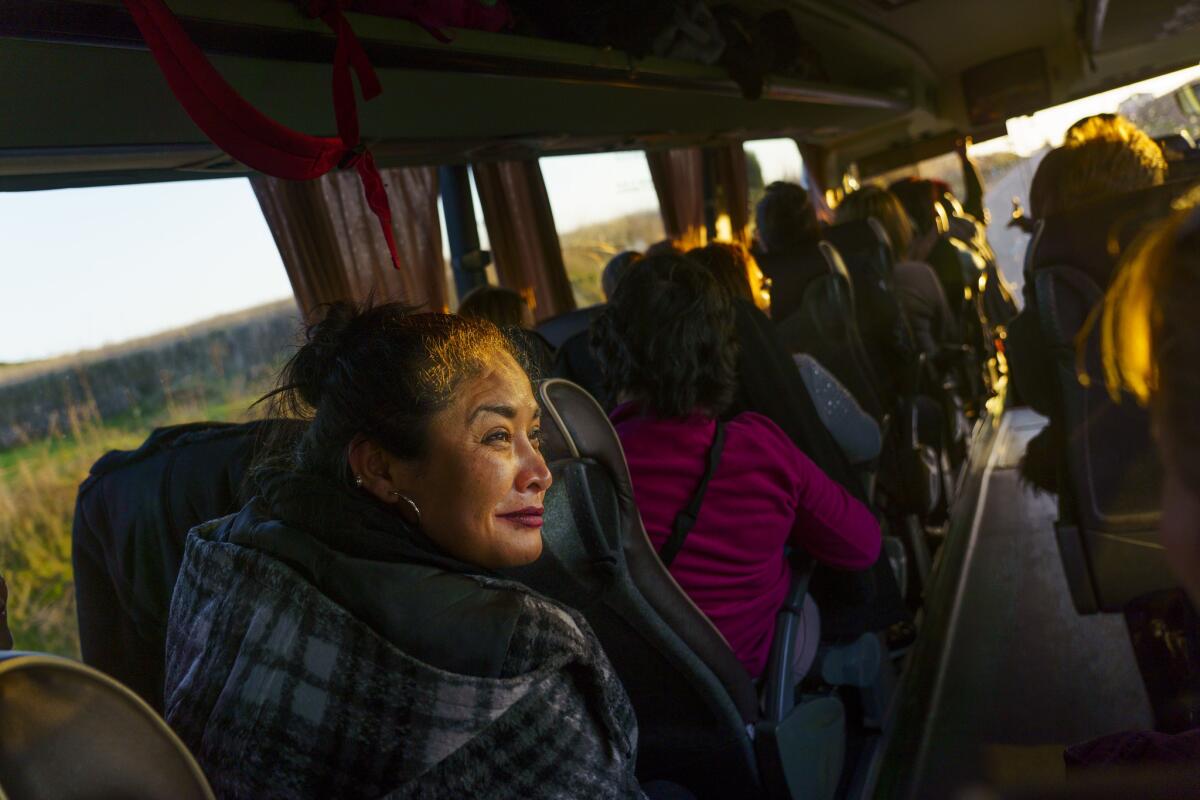
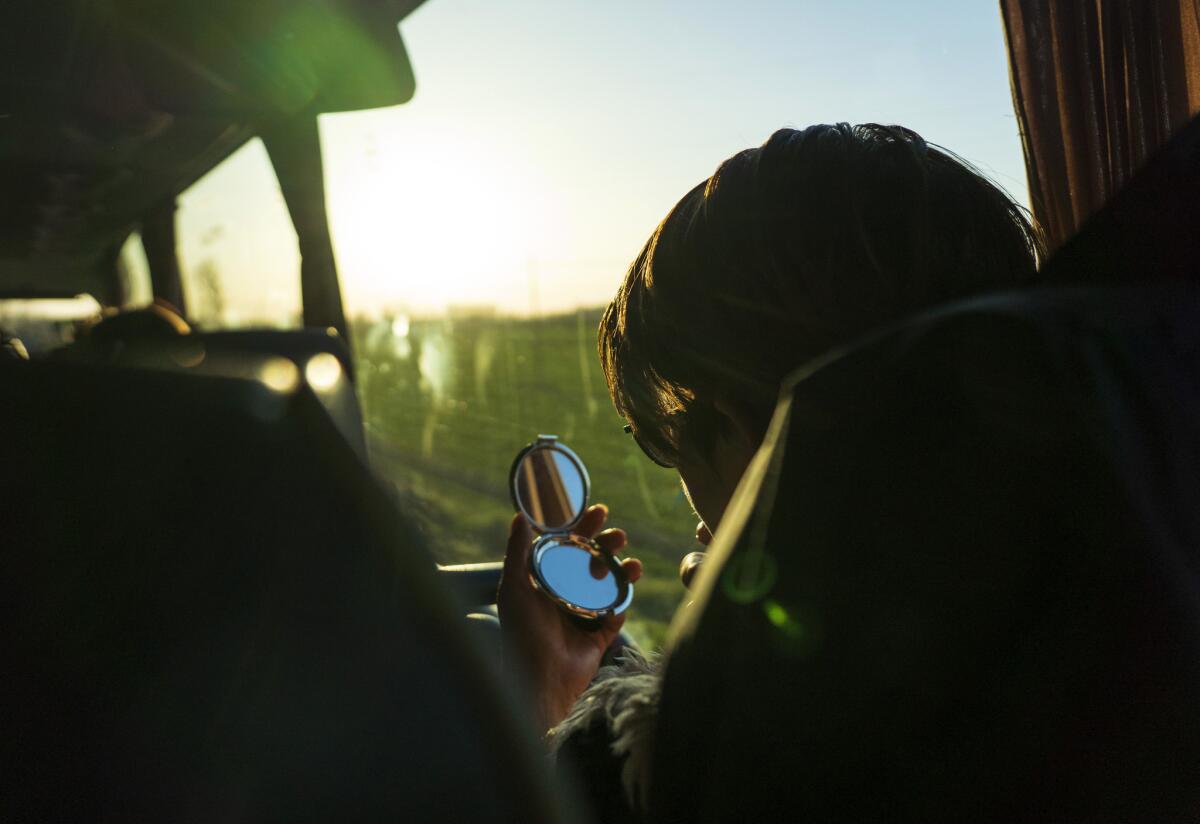
The first “caravan of women” shipped out in 1995. Manuel Gozalo, a businessman from Segovia, was worried about the slow demise of towns in rural Spain, where the population density is as low as 7 people per square mile. He’d heard about a town in Aragon whose young, single men had few dating options; in 1985, they invited a bus of women to visit for dinner and a party. The caravan was a success; a dozen couples married, and a former town mayor is the child of one of those couples. Gozalo wanted to copy the idea.
Rural Spain has long captured the country’s imagination, portrayed in literature as otherworldly, sublime. But some villages are nothing more than a handful of stone houses along a dirt road. There are no schools, no hospitals, no bars, no children. Calzadilla de la Cueza has 50 people officially registered as residents — but probably only 30 actually live there.
For decades residents have fled these towns for big cities, a migration trend started in the 1950s, when dictator Francisco Franco invested heavily in urban zones, leaving rural Spain to lag behind.
Today, 90% of the population lives in 1,500 cities and towns that together occupy only 30% of the country’s land. In many rural towns, aging male farmers are often the only ones left. Sometimes, days pass before they see a woman.
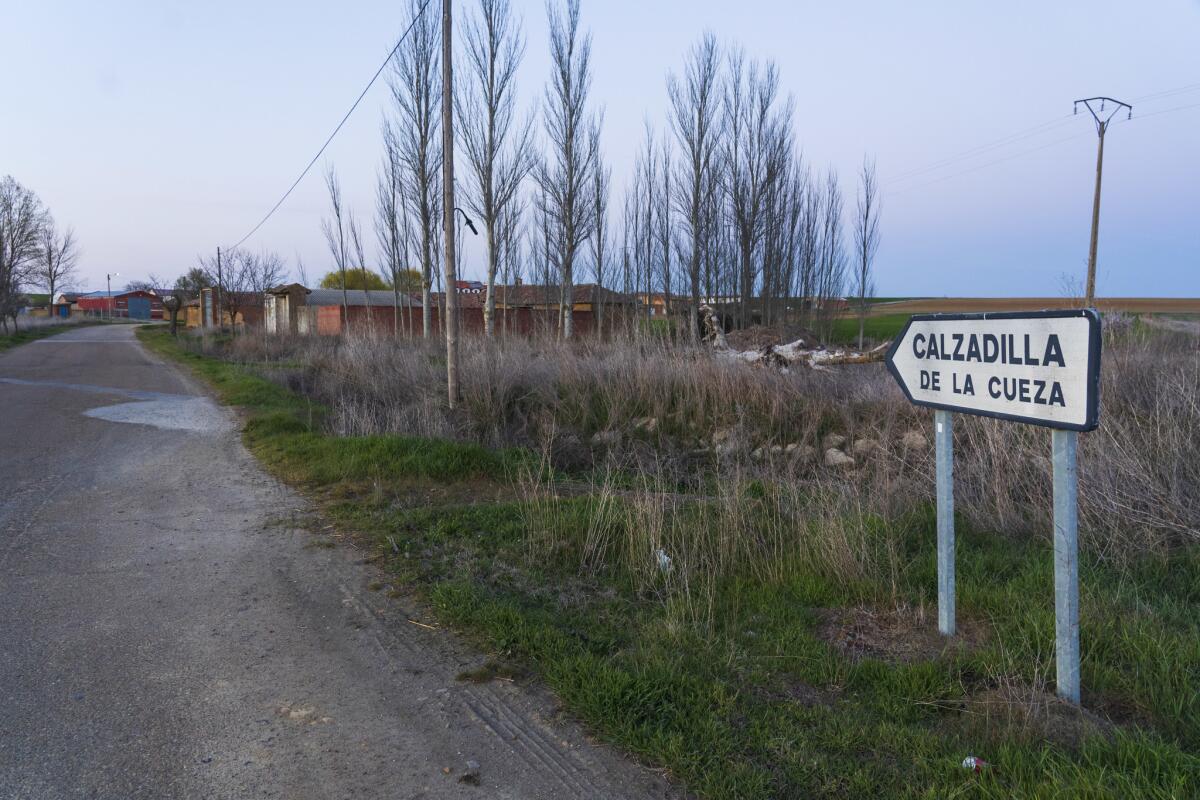
That’s why the caravans are important, says Cesar Acero, the hotel owner. These men need company.
Acero wears flared pants and a broad smile, greeting the women as they enter the hotel.
They order jars of beer, bang their hands on the wooden tables in time to the ranchera music blaring from speakers. Gozalo begins to dance, the tips of his walrus mustache turning up as he grins. His wife, Venecia Alcantara, rushes about, offering greetings and telling stories in a booming voice.
The men finally show up around 9:30.
In the dining room, there is no assigned seating, but the idea is that no two women will sit next to each other — that men and women will mix. That doesn’t always happen. Many awkwardly shuffle to the long tables and try to snag seats near friends.
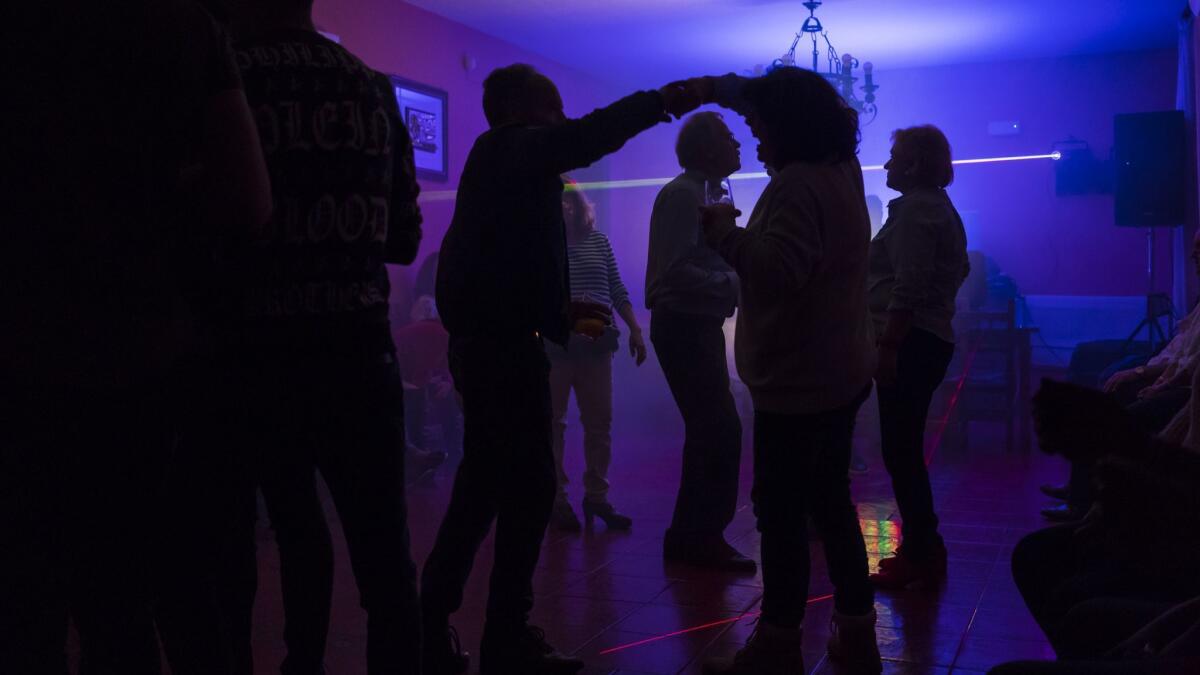
The women far outnumber the men, and many places at the long banquet tables remain empty by the time the main dish, oxtail and thick-cut French fries, is served. Conversation at Quintana’s table is intermittent, strained. She picks at her oxtail and gazes on as her niece laughs with the men seated next to her. Quintana tries to say something to the men across from her, but her comment falls flat, and she returns her gaze to the oxtail. The table is quiet, save the clinking of forks and knives.
A woman from Colombia flirts with the man next to her. They met at an event a few years ago and meet up from time to time. The only reason he came to the hotel, he says later, was to see her. But at the dining table, she's adamant they're only friends. He frowns. They, too, fall quiet.
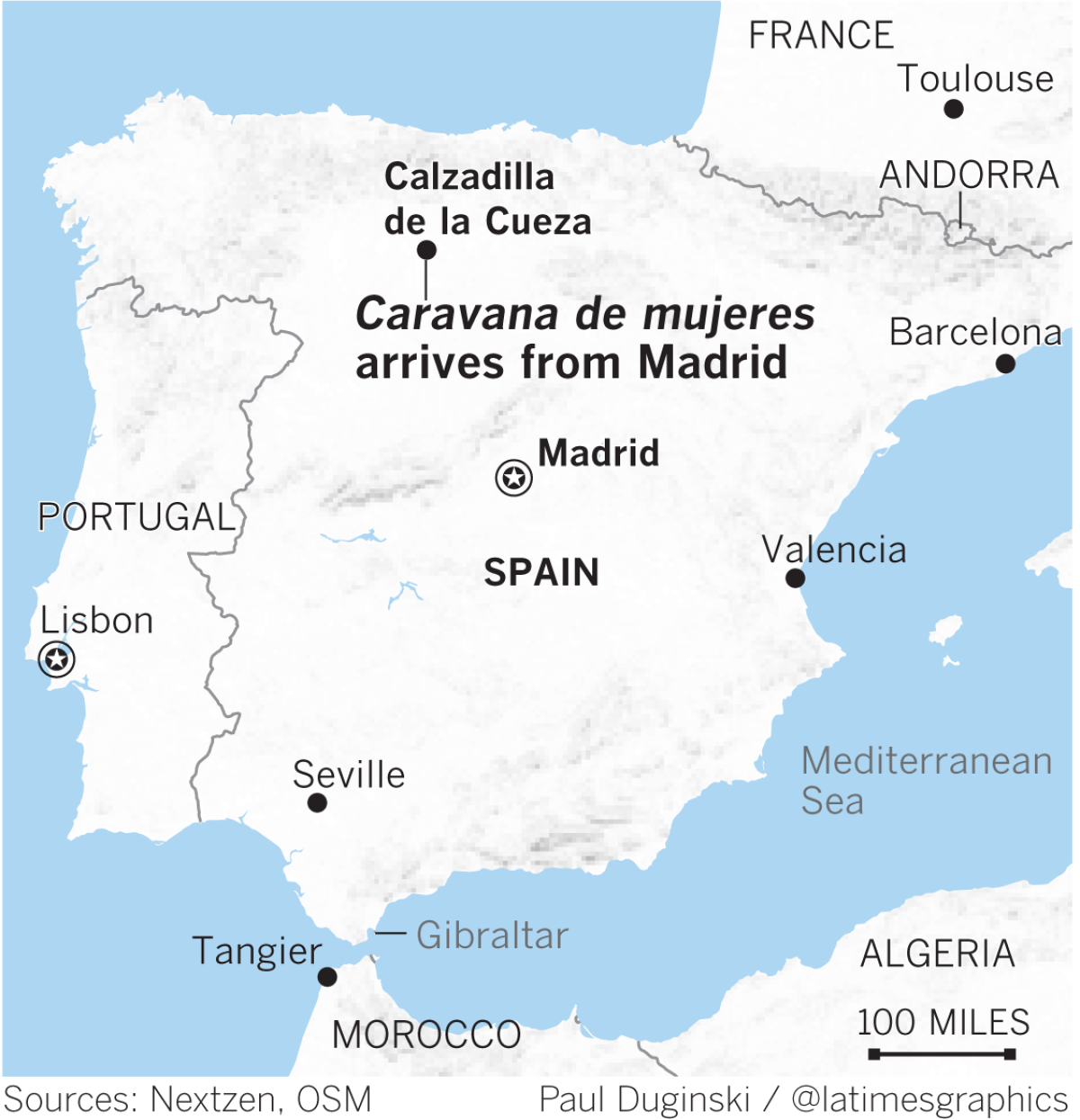
The caravans have long courted controversy. Feminists have staged protests against the caravans, pointing out that the majority of women are Latin American immigrants, while the men tend to be landowners living in deeply conservative regions where remnants of Franco’s right-wing, Catholic ideology loom large.
In November, members of Castilla La Mancha’s United Left party wrote an opinion piece for the newspaper El Diario arguing that the caravans treated “women as commodities” and were “a vestige of an old-world past, profoundly machista.”
Gozalo and Alcantara dismiss these criticisms. The women, they say, come of their own accord, and more than 100 couples have married. In fact, Gozalo and Alcantara met at his third caravan.
In years past, two or three caravans left Madrid each month, and town governments helped cover the costs. Now, in the wake of Spain’s financial crisis, Gozalo tries to organize one caravan a month, and towns usually don’t subsidize them.
Not every woman has come to Calzadilla de la Cueza for the men. At 23 dollars, the caravans offer a cheap day trip and a chance to breathe clean country air. Men pay more, usually from 34 to 68 dollars.
“If something happens, it happens,” says Ines Quilindo, 60, as she digs into a slice of flan, friend Hilma Blanco seated next to her. “Would I die for a man? No.”
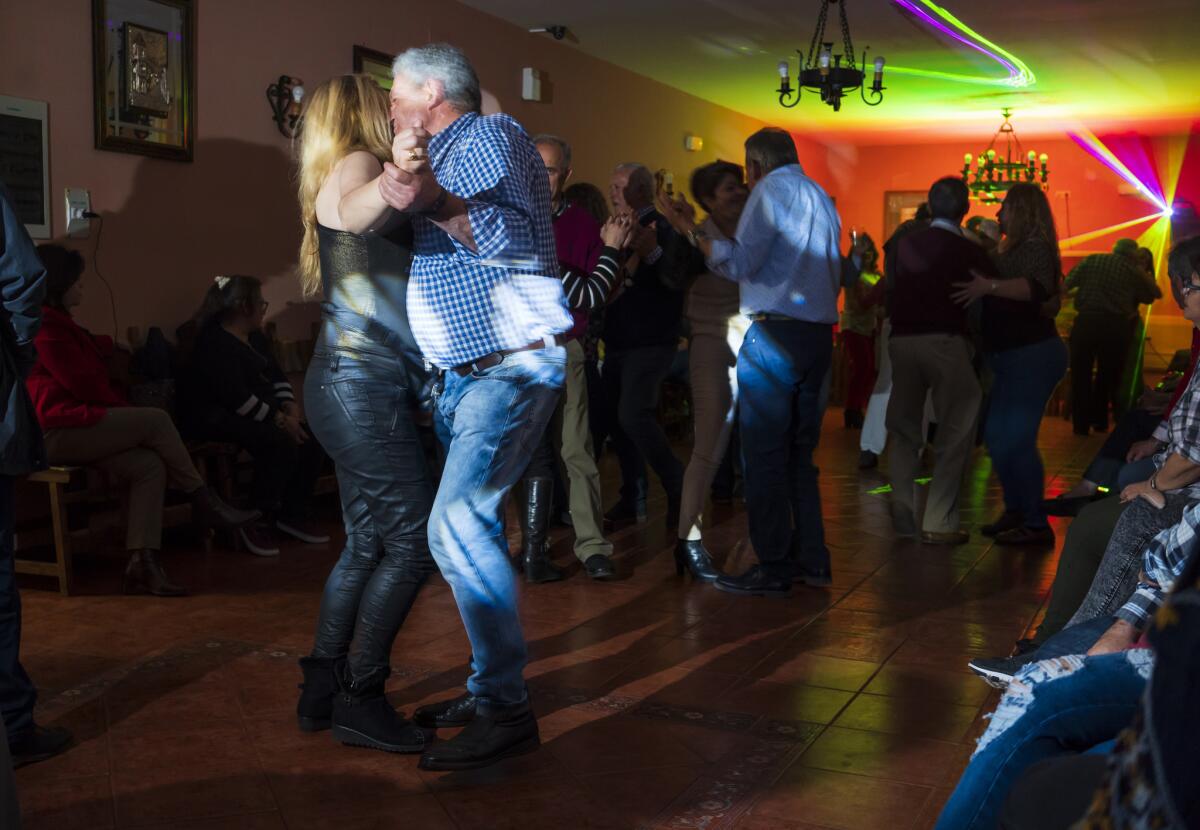
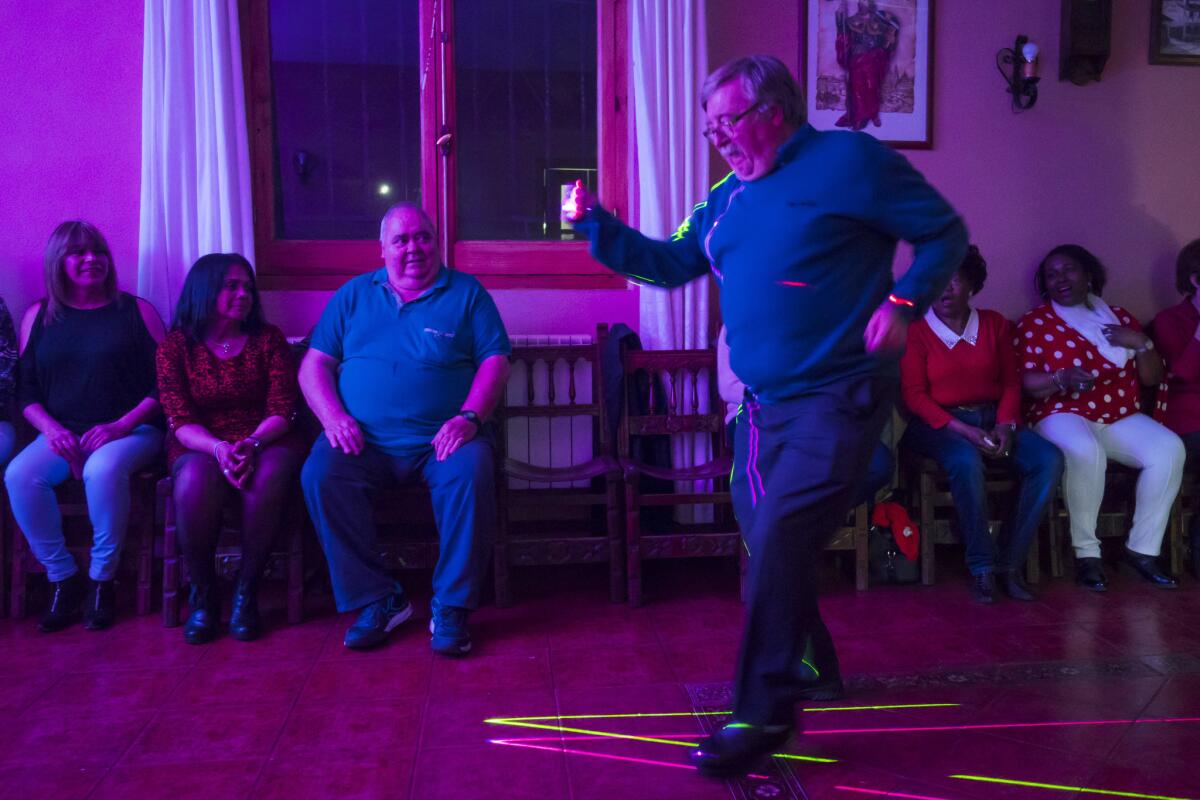
Quilindo and Blanco, 66, were neighbors in Cali, Colombia, and both ended up in Madrid. Blanco is more open about wanting to find a partner; she’s been to 15 caravan events, and while she’s had brushes with love, nothing has ever stuck.
But she’s content to spend a day with this group of women. They share a special kinship. When they sit together and discuss troubles in their home countries — inflation and drug trafficking and gangs — they nod in understanding.
Many have harrowing histories similar to Blanco’s. At age 14, she was married to a policeman who dragged her around the house by her hair and blackened her eyes. At 15, she had her first child.
At the dinner table, Blanco proudly shows off a photo of her oldest daughter. The other women also take out their phones and brag about children, coo over grandchildren.
As the diners wander over to the bar for coffee and tea, waiters swiftly move the tables and chairs to transform the banquet hall into a dance floor.
The deejay plays Enrique Iglesias’ “Loco” and the dance floor lights up in red and green and blue. Partners spin around the room, their steps a passport of global styles: Colombian salsa, Cuban rumba, Spanish flamenco.
The women’s steps quicken. They click their heels, twirl, sashay, stomp, their eyes closed, their brows furrowed in concentration. Left right, left right, left right, spin. They are in command on the dance floor; the men are slower, clumsier, struggling to keep up.
Soon the darkened room smells of sweat and beer and tobacco. A machine emits smoke, shrouding the room in an ethereal fog. When the song changes, the dancers collapse onto chairs, catching their breath.
At the bar, a few men stand idly, nursing beers. Felipe Alonso Hoyos, too shy to make conversation with a woman, leans against the wooden bar with a friend, watching dancers straggle in and out.
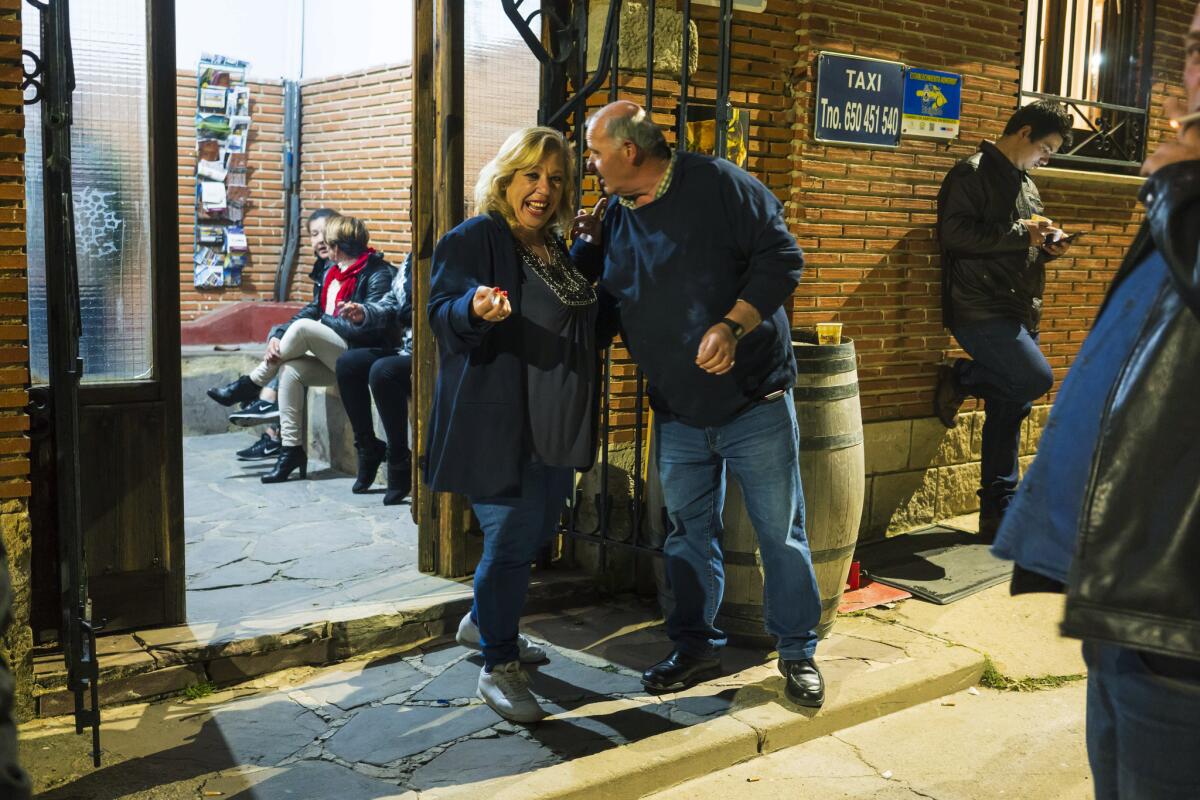
It’s nice to see a bar full of people, Hoyos says. When he was young, the streets of his village were full of children playing. There were 33 boys in his class; the girls’ class had 40. Now in his 60s, Felipe is just one of 24 full-time residents in Villalumbroso. He hardly ever leaves town. “At a certain age, you get complacent,” he says.
At 1 a.m., three women slump over a table in another room, stone-faced and bored. It’s their first time at a caravan, and they won’t be returning.
“I was expecting gentlemen,” says Janeh, a woman from Ecuador who declined to give her last name. She came with a Cuban friend and had hoped for conversation with polite men. Instead, she suspects the men on the dance floor have other intentions. Janeh and her friend ask around to see if anyone has a car, if they could catch a ride back to Madrid. Nothing. They have three hours until the bus leaves.
At 3 a.m., Quintana, Quilindo and Blanco gather around a table to share a beer and exchange phone numbers. Blanco has just said goodbye to a man named Angel, with whom she had been dancing for hours.
“She found her prince!” Quilindo exclaims, and the women giggle. Blanco rolls her eyes. Angel, who lives near Madrid, had made extravagant offers, like a trip to Rome, but she wasn’t so sure about him. He had put his hand on her leg and taken a photo of her without permission. When he offered to drive her back to Madrid, she declined.
Instead, she’s thinking about another man, Juan Antonio, whom she met at a caravan six years ago. He was a farmer and his fridge was always full of his recent harvests: tomatoes, peas, zucchini. Blanco visited three times, and each time he cooked for her. She was in love. He wanted to marry.
But his mother thought Latin Americans “bad women” and forbade her 58-year-old son to marry Blanco. The two no longer speak, but she thinks of him often.
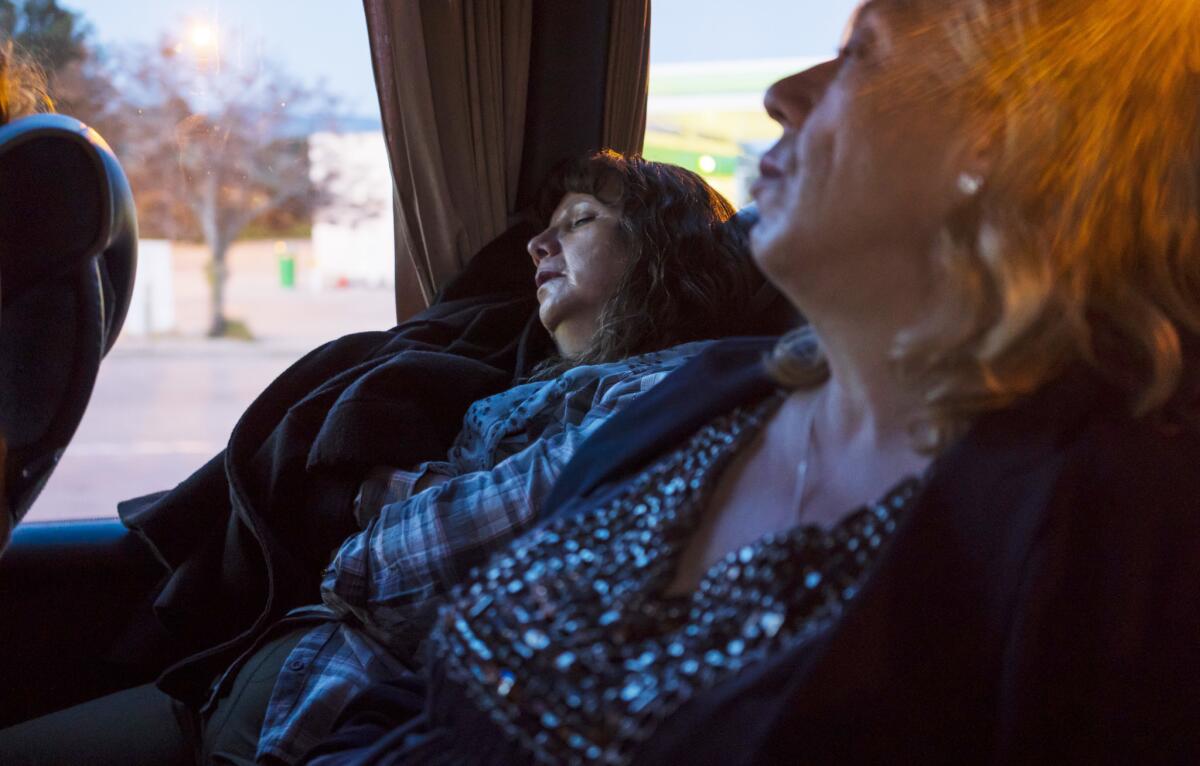
“That mother is a manipulator,” Quilindo says angrily, and Blanco sighs: “He was so loving.”
Quintana offers a story of her own. “I also met a man, and we fell in love. But we forgot to exchange numbers.”
At 4 a.m., Alcantara announces that the bus will soon depart. The city women finish their last beers, kiss men on the cheek and step out into the cold night, the street awash in pale moonlight and littered with cigarette butts. On the bus, they soon settle into sleep. Four hours later, they arrive in Madrid.
The women descend into the waking city, where waiters have just begun heating milk for cafe con leche and street vendors are setting up shop on the sidewalk.
They button their coats, rubbing sleep from their eyes and stifling yawns. Their lipstick is smudged, their eye shadow faded. They hug and kiss and wave goodbye. Hasta la proxima, they tell one another. Until next time.
Sign up for Essential California
The most important California stories and recommendations in your inbox every morning.
You may occasionally receive promotional content from the Los Angeles Times.







